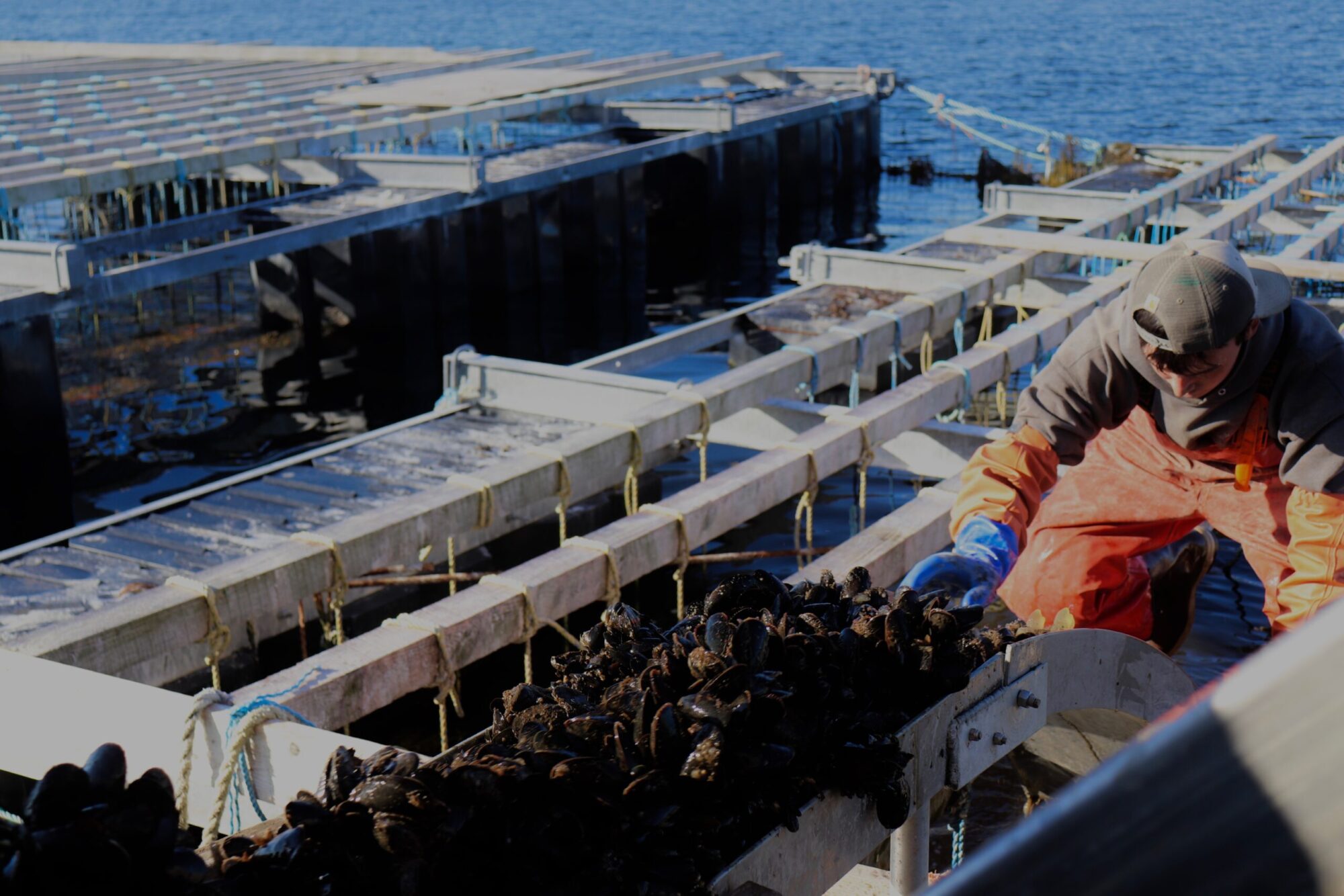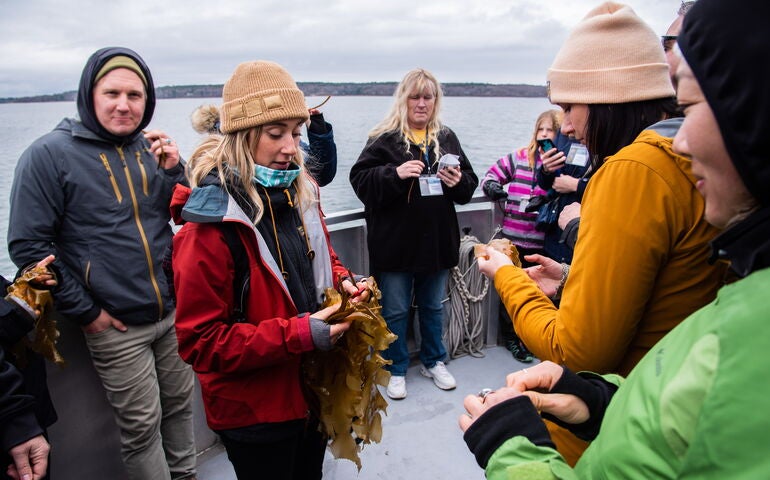 Aquaculture training workshops will focus on women, nonbinary students
Aquaculture training workshops will focus on women, nonbinary students
MaineBiz, 1/5/24 – “As increasing numbers of women enter the aquaculture sector, a new series of free training workshops may help them build skills to get out on the water. The series is also intended to help empower and build community among women and nonbinary aquaculturists. The 2024 Women in Aquaculture series will be hosted by the Aquaculture in Shared Waters training program, which has helped commercial fishermen and farmers start and improve their aquaculture businesses in Maine for over a decade..”
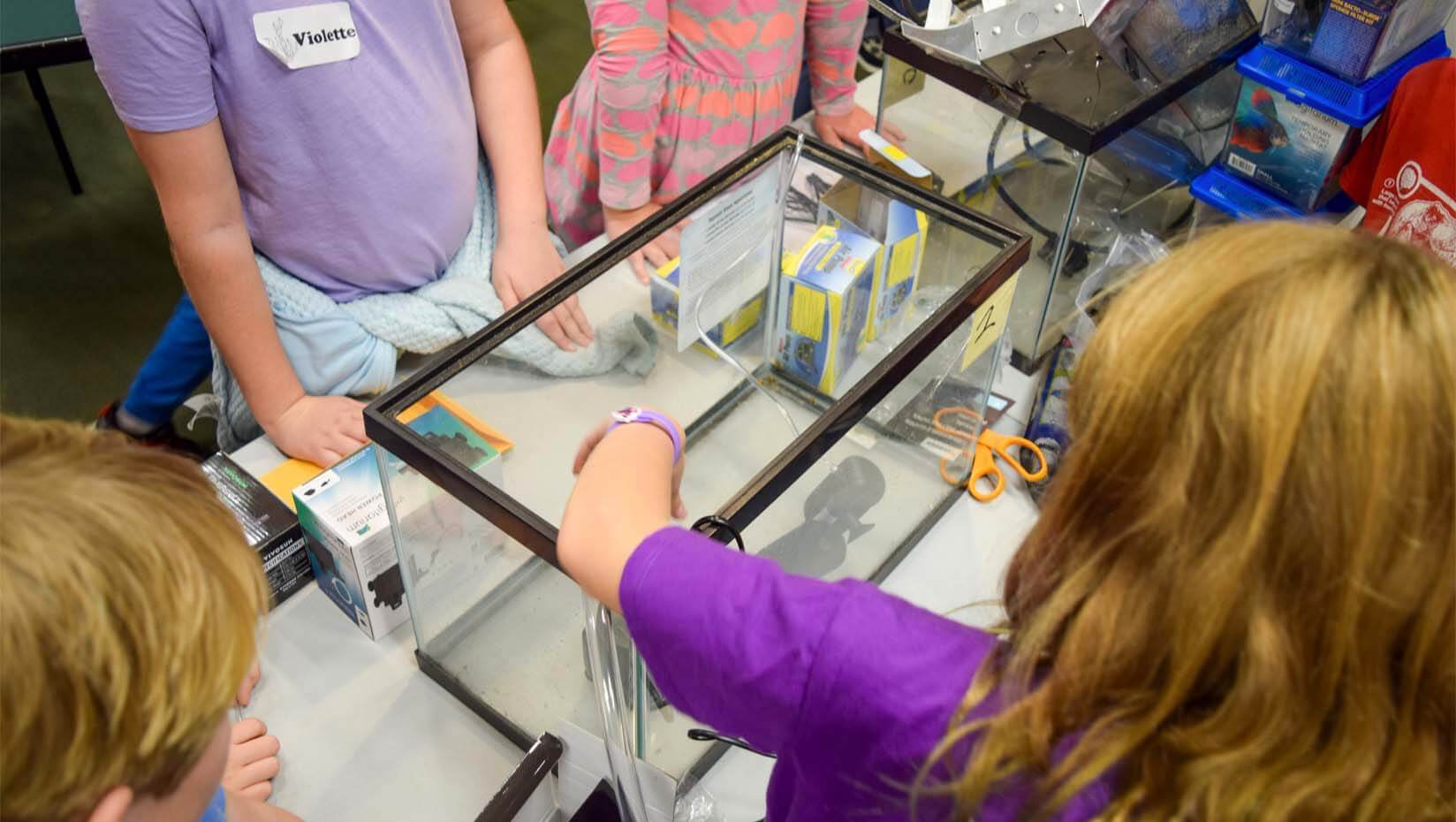 UMaine Extension receives $750,000 to boost aquaculture learning tools With Maine aquaculture expected to grow, the next generation of farmers learn the ropes
UMaine Extension receives $750,000 to boost aquaculture learning tools With Maine aquaculture expected to grow, the next generation of farmers learn the ropes
UMaine News, 11/2/23 – “University of Maine Cooperative Extension has received a $750,000 grant to support the development and implementation of virtual reality and other innovative learning tools focused on aquaculture technology. The grant, part of an $8.2 million funding effort by the National Institutes of Food and Agriculture (NIFA) to boost non-formal education, aims to increase awareness and understanding of Maine’s aquaculture industry among youth and educators.”
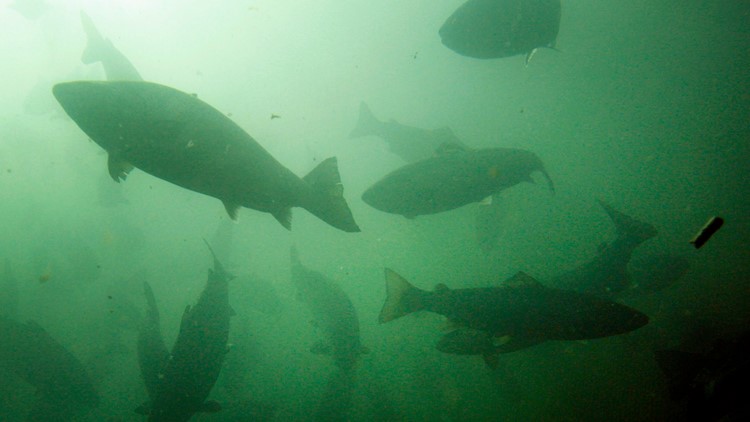 More wild Atlantic salmon found in Maine rivers than any time in the past decade, officials say
More wild Atlantic salmon found in Maine rivers than any time in the past decade, officials say
CBNC, 9/6/23 – “Lobsters have long been a staple of the Maine economy, worth roughly $388 million last year alone, but climate change is putting the catch at risk. Now lobstermen and women, along with local entrepreneurs, are turning to a new and potentially even more lucrative staple: Seaweed. Roughly 90% of seaweed is currently grown overseas, but the U.S. seaweed market is expected to grow to over $5 billion over the next six years, according to research and data provider Fact.MR. Seaweed is most commonly used in foods and supplements, but it has recently branched out to cosmetics, clothing and bio-plastics. Seaweed is also a natural carbon sink, helping the ocean to absorb excess carbon dioxide from the atmosphere.”
Maine seaweed farming conference promotes sustainable growth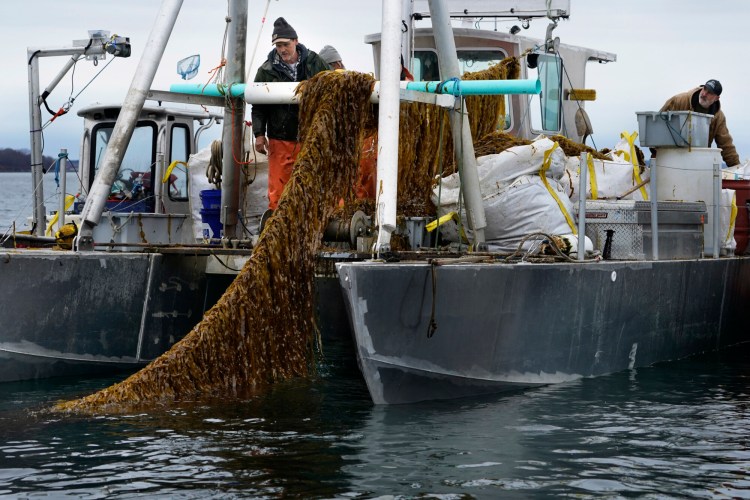
Portland Press Herald, 9/7/23 – “Three kelp farms operating off Long Island harvested more than 200,000 pounds of seaweed in 2022, which is about one-quarter of nearly 1 million pounds produced last year by some 40 growers along the Maine coast. For Nathan Johnson, it’s a point of pride that Long Island produced more kelp than any other seaweed-farming community in the United States. His family has lived on the island and fished the waters of Casco Bay for centuries, and he sees kelp farming as a way to keep them there.”
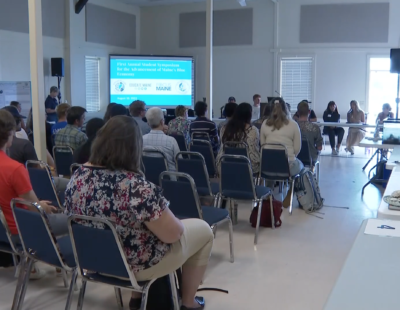 With Maine aquaculture expected to grow, the next generation of farmers learn the ropes
With Maine aquaculture expected to grow, the next generation of farmers learn the ropes
Spectrum Local News, 8/10/23 – “Tess Hureau spent the summer interning at a Brunswick aquaponics company that grows fresh vegetables and fish. For the University of Maine aquaculture student, it was a chance to expand her knowledge beyond fish to sustainable plants. ‘It was so interesting,’ she said Thursday in Belfast at the Student Symposium for the Advancement of Maine’s Blue Economy. ‘I learned about what it takes to run a farm, basically.’ And when the rising senior from Colorado finishes her schooling, she plans to stay in Maine. ‘I would love to keep on working in the aquaculture community,’ she said. ‘Maybe try an oyster farm or working with fish.'”
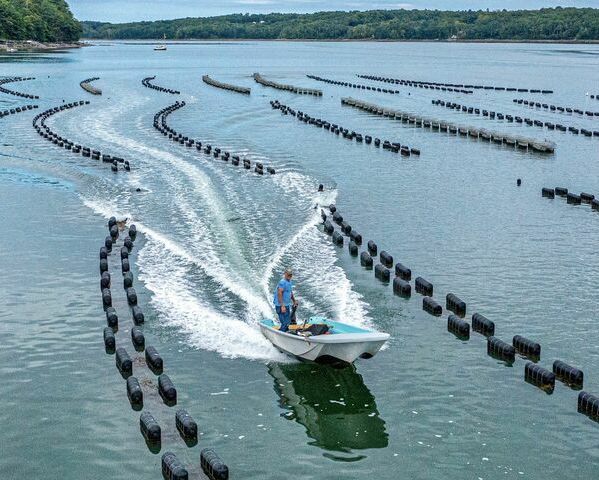 Sea farmers get another tool to help boost business
Sea farmers get another tool to help boost business
MaineBiz, 8/10/23 – “Maine’s aquaculture industry is on a roll when it comes to new ways to help it grow. Developments in the past few years include publication of a first-of-its-kind financial benchmarking report for the industry, the nation’s first occupational standards and a Maine shellfish aquaculture career pathways map, as well as the launch of the nation’s first aquaculture apprenticeship program in the U.S. Now the Maine Aquaculture Association has released another new tool to help aquaculture farmers finance their businesses.”
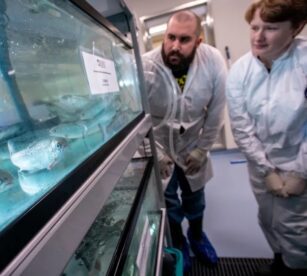 UMaine plans $10M center to train students for fish farm jobs
UMaine plans $10M center to train students for fish farm jobs
Bangor Daily News, 7/24/23 – “The University of Maine is designing an aquaculture center that would expand research and provide workforce training to meet growing industry needs in the state. The 15,000-square-foot center, which UMaine is still designing and would be on the Orono campus, would include tanks and other equipment resembling a recirculating aquaculture system, a fish-farming technology that recycles water and is considered more environmentally friendly than traditional methods. There will be classrooms and small laboratories for undergraduate capstone projects and studying subjects like feed development.”
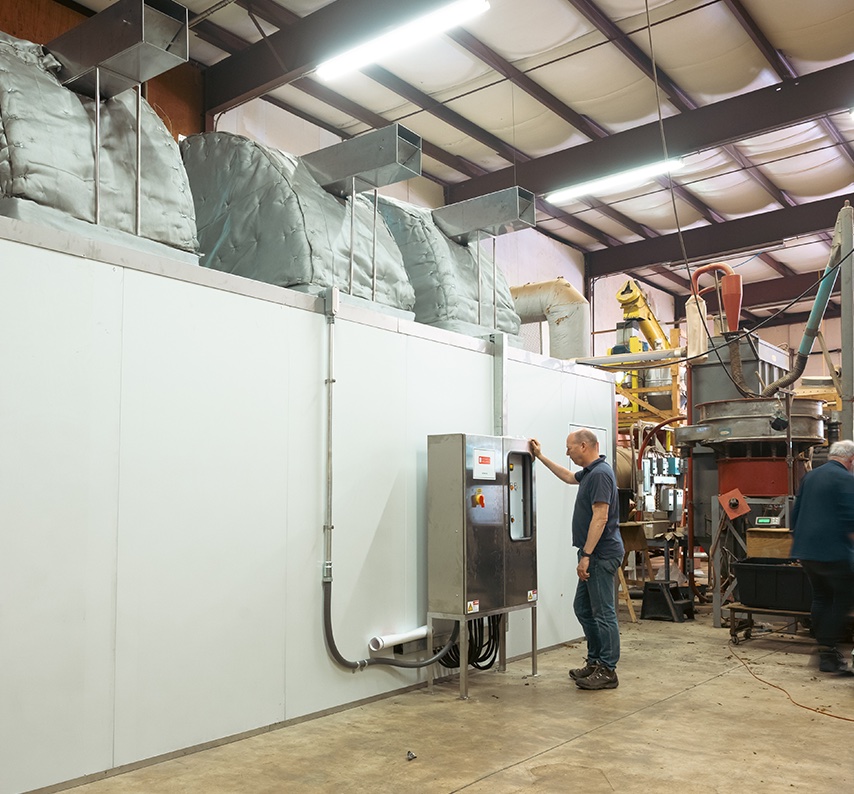 Maine seaweed farming company secures a kelp dryer and promptly decides to share it
Maine seaweed farming company secures a kelp dryer and promptly decides to share it
Global Seafood Alliance, 7/17/23 – “With more U.S. seaweed farms coming online on both the Atlantic and Pacific coasts, producers’ concerns are shifting from raw material procurement to processing. With well-established preferences for seaweed products in the marketplace, it behooves local producers to meet them to wean the market off of imports. When Mitchell Lench, CEO of Oceans Balance in Biddeford, Maine, discovered an industrial kelp dryer that could dry up to 3 million pounds of farmed seaweed annually was available in South Africa, he jumped at the opportunity to purchase the $650,000 machine and ship it across the sea. Oceans Balance had been blanching and freezing its farmed kelp for years because there wasn’t a suitable dehydrator available. It was limiting their business options.”
Aquaculture trainees learn the ropes in summer programs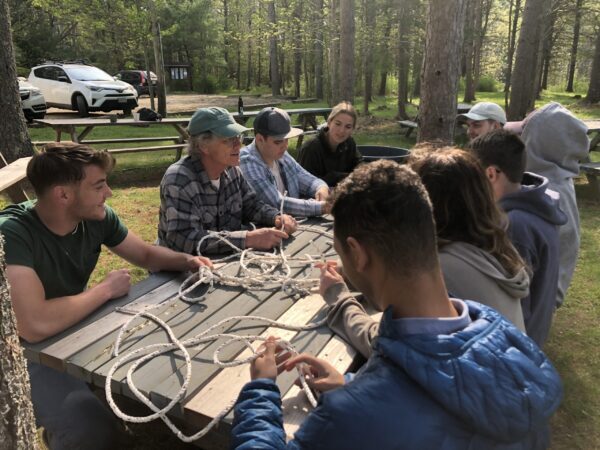
Mainebiz, 7/14/23 – “New aquaculture apprenticeship and pre-apprentice programs are getting clear signals that the industry is on to something when it comes to recruiting and training workforce. This summer, 19 pre-apprentices are working on 18 aquaculture farms along the coast. And people have moved from as far as California and Alaska, including former commercial fishermen, to enroll in the apprentice program. The programs are a collaboration of FocusMaine, Educate Maine, Gulf of Maine Research Institute and Maine Aquaculture Association. The two experiential learning programs aim to create a career pathway into Maine’s aquaculture sector.”
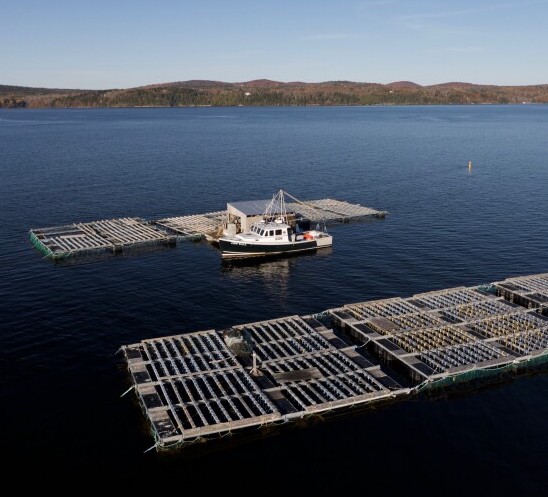 Better connecting the fishing and aquaculture communities in maine and beyond
Better connecting the fishing and aquaculture communities in maine and beyond
National Fisherman, 6/20/23 – “While the ways that aquaculture can actively support commercial fisheries have been well established, there is nonetheless a tension between certain fishing and aquaculture communities. Though it can be easy to look at these two industries in a monochromatic way, aquaculture can open up brand-new opportunities for fishermen. Aquaculture farms represent another form of income for fishing families and can open up additional opportunities to employ those looking to get involved in jobs on the coast. The tension between these communities can become prominent when certain perspectives are exclusively focused on, and National Fisherman fell into that trap with a recent article that only explored one perspective around the creation of a fish farm in Frenchman Bay, Maine.”
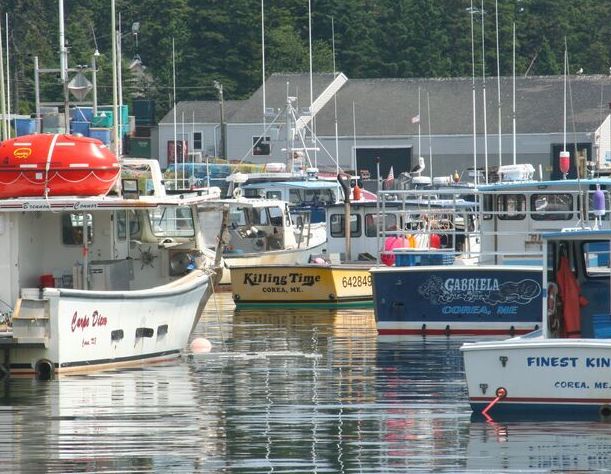 seafood industry contributes $3.2B a year to the maine economy
seafood industry contributes $3.2B a year to the maine economy
Mainebiz, 5/31/23 – “The first-ever report on Maine’s seafood sector as a whole, including downstream contributors, found in 2019, the sector contributed over $3.2 billion in total economic output to the Maine economy. The largest contributors were retail seafood, at $692 million, followed by lobster harvesting at $511 million and seafood processing at $343 million. The sector supported over 33,300 jobs statewide in 2019, including 23,846 in sector industries and 7,300 additional jobs supported by other indirect and induced multiplier effects. The report was commissioned by Seafood Economic Accelerator for Maine, or SEA Maine for short.”
